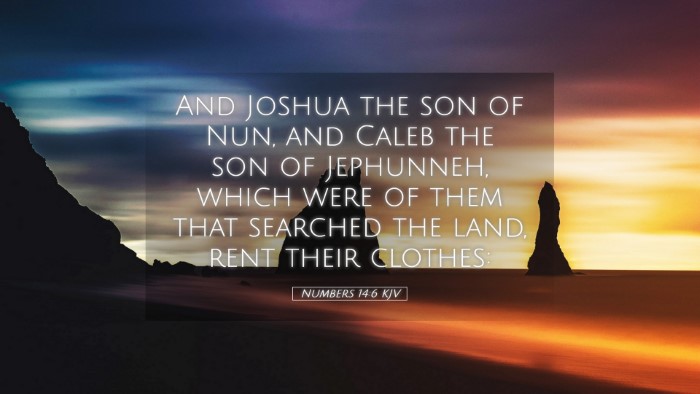Commentary on Numbers 14:6
In Numbers 14:6, we encounter a pivotal moment in the narrative of Israel's journey through the wilderness. This verse reads:
“And Joshua the son of Nun, and Caleb the son of Jephunneh, which were of them that searched the land, rent their clothes:”
Contextual Overview
The preceding chapters narrate the Israelites’ exploration of Canaan, their response to the spies' reports, and the growing mistrust among the people. As fear and rebellion take root, Joshua and Caleb represent a stark contrast with their faith in God's promise.
Insights from Commentaries
Matthew Henry's Commentary
Matthew Henry emphasizes the desperation of Joshua and Caleb upon hearing the dismal report from the other spies. Their act of tearing their clothes is described as a sign of mourning and distress, which signifies their deep concern for the people's impending doom.
-
Faith vs. Fear: Henry points out that Joshua and Caleb exemplify true faith amidst a congregation paralyzed by fear. Their actions highlight not just personal conviction but a desire to inspire courage in the Israelites.
-
Intercession: The tearing of their garments represents more than regret; it is also an intercessory cry for the people to consider the consequences of their disbelief and rebellion against God.
Albert Barnes' Commentary
Albert Barnes provides a detailed analysis of the significance of Joshua and Caleb in this narrative. He observes their unique qualifications as leaders who have witnessed God's promises firsthand.
-
Historical Significance: Barnes remarks that Joshua and Caleb are the only two out of the original explorers allowed to enter the Promised Land, accentuating God’s reward for their faithfulness.
-
Clothing as a Symbol: The act of rending their clothes serves as a potent symbol of grief, indicating their strong emotional reaction to the disbelief of the people. In Hebrew culture, such acts were a customary expression of lamentation.
Adam Clarke's Commentary
Adam Clarke offers a thorough exegesis of this moment, interpreting it within the broader theological implications. He highlights the narrative's didactic purpose, revealing lessons regarding faith, obedience, and divine promises.
-
Contrasting Responses: Clarke notes the contrast between Joshua and Caleb’s faith-filled plea and the Israelites’ despair, suggesting that their boldness exemplifies a profound trust in God’s power and faithfulness.
-
Theological Reflection: Clarke posits that this account conveys a critical theological reflection on obedience to God. He urges readers to recognize Joshua and Caleb as faithful leaders who not only trust God but also challenge the community to do the same.
Theological Themes
This verse encapsulates several profound theological themes crucial for today's pastoral and scholarly reflection:
-
Leadership: The integrity and faithfulness demonstrated by Joshua and Caleb serve as quintessential examples of leadership in faith. Their ability to stand against the majority emphasizes the role of godly leaders in guiding communities toward obedience to God.
-
Crisis of Faith: The Israelites’ response reflects a broader human tendency to doubt in times of distress. This offers a powerful reminder of the importance of remaining steadfast in faith, even when circumstances appear overwhelmingly adverse.
-
God’s Promises: This narrative reinforces the idea that God’s promises are grounded in His covenant faithfulness. Joshua and Caleb remind us that faith in God’s reliable nature can conquer fear and despair.
Application for Pastors and Scholars
For pastors, the exhortation from this passage is clear: encourage your congregations to cultivate a faith that mirrors that of Joshua and Caleb, particularly in the face of overwhelming odds. For scholars, this passage serves as a focal point for discussions about the nature of faith, obedience, and God’s character in the Old Testament.
As you reflect on Numbers 14:6, consider the following applications:
-
Faithfulness in Leadership: How can current leaders cultivate a spirit of faith in their congregations?
-
Responding to Doubt: What systems are in place to address crises of faith within your community?
-
Encouragement and Exhortation: In what ways can you remind your community of God’s promises amidst their fears?
Conclusion
In summary, Numbers 14:6 portrays a powerful moment of both grief and deep faith. Joshua and Caleb's actions invite us to reflect on our own responses to challenges and to consider how we can emulate their courage in our spiritual journeys. With insights drawn from respected commentators, we are reminded of the enduring lessons from this text, fostering a greater appreciation for God’s unwavering faithfulness.


